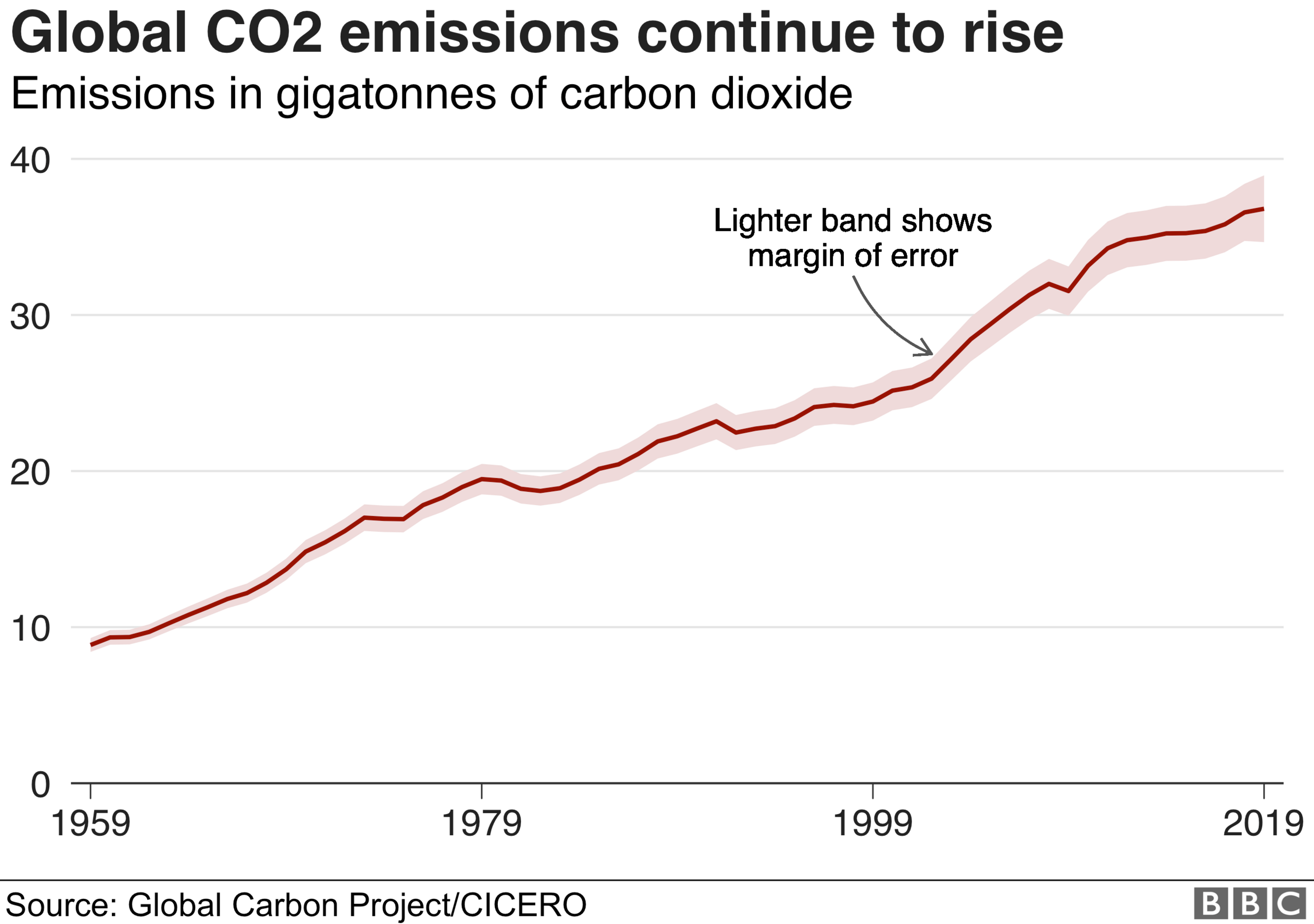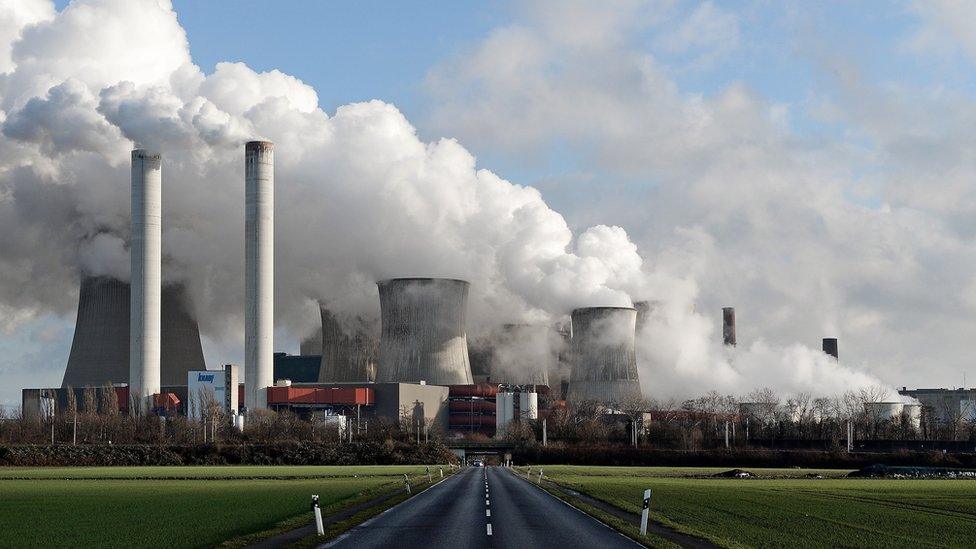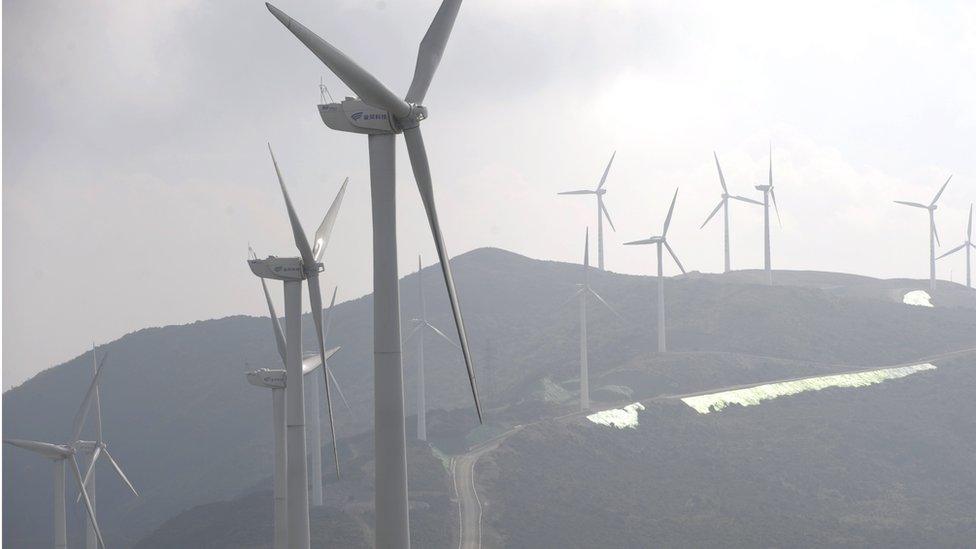Climate change: Emissions edge up despite drop in coal
- Published
- comments

Researchers say that carbon dioxide emissions this year have risen slightly, despite a drop in the use of coal.
The Global Carbon Project's annual analysis of emission trends suggests that CO2 will go up by 0.6% in 2019.
The rise is due to continuing strong growth in the utilisation of oil and gas.
Since the Paris agreement was set out in 2015, CO2 emissions have risen by 4%.
Last year saw a strong rise in emissions of almost 3%, with strong demand for coal in China being the main factor. There was also a surge in demand for oil, driven by a booming global market for cars, particularly SUVs.
This year's modest rise, if indeed it is a rise, as the margin of error is large, reflects some significant changes in the demand for fossil fuels.

While global emissions from coal use fell by less than 1%, this masks some huge drops in countries like the US and across the European Union.
"Through most of 2019 it was looking as if coal use would grow globally, but weaker than expected economic performance in China and India, and a record hydropower year in India - caused by a strong monsoon - quickly changed the prospects for growth in coal use," said Robbie Andrew, a senior researcher at the Cicero Centre for International Climate Research, part of the Global Carbon Project.
"Coal use in both the US and the EU28 has dropped substantially, possibly by as much as 10% in both regions in 2019 alone, helping push down global coal consumption," Mr Andrew said.
The drop in coal as a source of energy was offset by the continued rise of oil and gas.
The data comes as the COP25 climate summit continues in Madrid amid a growing sense of crisis.
COP25: What you need to know about the climate conference
Gas use rose by a robust 2.6%, and while renewable sources like wind and solar have also grown substantially, according to the authors the greener fuels have merely slowed the rise in the growth of fossil fuel emissions.
"Compared to coal, natural gas is a cleaner fossil fuel, but unabated natural gas use merely cooks the planet more slowly than coal," said Dr Glen Peters, also from Cicero.
According to the Global Carbon Project researchers, the continuing use of fossil fuel-based technology is threatening the targets that countries have set for themselves in the Paris climate agreement.
"This is still not good news this year, as the emissions are still going up, the emissions are going more slowly, so we are making progress but the actions need to be higher in terms of implementing renewable energy and removing those tech that produce CO2," said Prof Corinne Le Quéré from the University of East Anglia (UEA), another author of the research.

Coal use has dropped substantially in both the US and EU28
There are some interesting developments on a country level in the emissions data.
US emissions have declined by around 1% per year every year since 2005. That trend continued in 2019.
Even with President Trump's favourable policies towards fossil fuels, cheap gas, wind and solar are replacing coal.
The man who took wind power to another level
China's emissions are expected to rise up by 2.6% but would have been higher if it wasn't for slower economic growth and a weaker demand for electricity.
Similarly in India, slower economic growth has seen a much smaller rise in emissions expected to be 1.8% compared to the normal recent rate of 5.1%.
The figures show just how far back the world is in terms of meeting the goals of cutting carbon quickly to avoid dangerous temperature rises.
"There are lots of countries now that are ramping up their policies on climate change but still not big enough," said Prof Le Quéré.
"There's not enough countries making commitments. The big emitters are still awaited at the table - so 2020 will be a really big year for countries on climate change."
Follow Matt on Twitter., external
- Published3 December 2019

- Published2 December 2019

- Published3 December 2019

